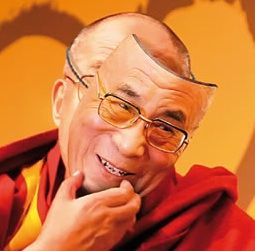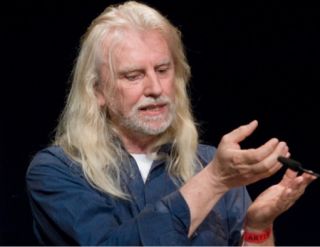
His Holiness
The Dalai Lama (DL) is a unique phenomenon in today’s world. More than anyone else, he transcends ordinary social categories, including his home of Tibetan Buddhism (or a particular sect thereof). His acceptance, with the exception of the administration of the People’s Republic of China and perhaps a good part of its population, is global in reach. If we were to nominate a runner-up, who would it be? Nelson Mandela, Desmond Tutu, or Joseph Ratzinger? No one seems to come close to matching the DL in received recognition and reverence. The DL stands for wisdom, compassion, good humor, and serenity. He represents non-partisanship aside from the Sino-Tibetan dispute. He is, in other words, the closest thing to a god-king we currently have.
Millions of Westerners adore the DL more than anyone in history. John Paul II and Adolf Hitler may have commanded respect and love of similar intensity, but their impact was local. They also faced intense opposition from outside of their social group, especially in the case of Hitler. In contrast, the DL has managed to reach a position of high status without building up a camp of determined detractors. At least that’s what I thought until I read Colin Goldner’s 2008 book “Dalai Lama: Fall eines Gottkönigs.” As the book is available only in German, I summarize some of its points here.
Interestingly, the title of the book is a double entendre as “Fall” means both “case” and “fall.” Disappointingly, the book is too long with about 700 pages. It is saturated with details, redundancies, and repetitions. There are too many self-quotations and orthographical errors. The style is polemical; many words are taken from the flippant variants of the vernacular. This style may be hilarious and entertaining, but it reduces the impact of the arguments on the reader.
Despite these deficiencies, the book gave me pause. Goldner has evidently done a massive amount of research on the DL over many years. The research is not only archival, but it includes a fair amount of travel and other strenuous work. Some of Goldner’s arguments were published in reputable outlets over the years. The book is well referenced, allowing the reader to go down the trails to the sources.

Colin Goldner
Goldner argues that the DL is misperceived in the West, and that he has nurtured this misperception to his advantage. Goldner points out that few people have a clear idea what Tibetan Buddhism is about (see here for an essay translated into English). The religion retains many pre-buddhist folk beliefs and is populated with all manner of frightful demons. Between incarnations, these demons torture the souls with less than spotless karma. Goldner suggests that the lama caste has cultivated these folk beliefs to psychologically and thereby physically subjugate the population. The DL has not denounced the Dante-esque element of Tibetan Buddhism. When lecturing in the West, he avoids mentioning it but concedes when pressed. One wonders how the demonic layer of a religion comports with the claim that its core is compassion. Of course, this contradiction is not unique to Tibetan Buddhism.
At the sociological end, Goldner points out that before its annexation by the PRC Tibet was a feudal society with all the miseries and inequities that come with that. How would the DL propose to re-organize Tibetan society if he got his druthers? Would it be a feudal theocracy or a modern democracy? The DL has sent some signals suggesting that he wants to move away from the former. It remains to be seen what will come of it. So far, his Tibetan government in exile has not been recognized by any nation.
Goldner then turns to the question of how the DL achieved his extraordinary prominence. He suggests that it all started with the Nobel Peace Prize in 1989. Goldner's thesis is that the DL received the prize because the award committee sought a way to send a message of disapproval to the PRC in the wake of Tianamen. Repeatedly and rhetorically Goldner asks on what actual merits the DL received the prize when Vaclav Havel was a contender who actually worked for peace.
Once the prize was awarded, it set in motion a cascade of invitations, further prizes, and an avalanche of honorary doctorates. The latter are galling because the DL has no academic or scholarly work in the respective fields (e.g., law or chemistry) that might justify these honors. An honorary doctoral degree is a win-win-lose affair. The recipient and the granting institution win, while those who work for their doctorates see their degrees cheapened. Once in motion, a cascade is self-reinforcing. Universities compete with one another for the honor of granting yet another degree to someone who already has so many, which appears to document his worthiness.
Collecting degrees, attending conferences on science and spirituality (or just spirituality), hanging out with Hollywood household names, and leading his fans in contemplation gives the DL a staggering travel schedule. There is something incongruous about circling the world several times a year, year after year, while preaching, among other things, ecological awareness and compassion. The DL’s carbon footprint is that of a Yeti.
These, and other points found in Goldner's book, led to some head-scratching. I felt taken in by the simplest of publicity scams. The DL has successfully branded himself as a modern-age (new-age) prophet of overall goodness. The trick is that there is no there there. In the popular perception (my own included until last week) the DL is simply good. If asked just how and why and in which way he is good, what he has done for his fellow human-beings, we may come up with a list of modest achievements, but nothing that seems compatible with his rarefied status.
I then remembered my initial misgivings when reading a book by the DL. It is disturbing to realize that, caught up in the collective delusion of his apotheosis, I rationalized them away. When reading his Ethics for a new Millennium 10 years ago I was surprised how shallow it was. The DL seemed to think that one word, compassion, is the answer to all problems. I wondered how he would handle difficult ethical situations, such as moral dilemmas, situations in which different moral intuitions or rules collide. That’s where I thought (and still think), a moral system with any depth can show itself. How, for example, would the DL handle the trolley problem? Instead of trusting my instincts, I brushed them away and “got over it.”
More recently, I attended a lecture and Q&A session with the DL in Providence, Rhode Island. Again, I felt underwhelmed. It seemed that here was a rather superficial man who giggled too much and dodged complicated (or even interesting) issues. Nonetheless, I got caught up with his reputation and the positive collective response. When people asked me how it was, I said it was fine. The DL made 3 rather simple points. Because he is the DL, however, I thought we ought not hold him to a higher standard. We should not demand novel, deep, or useful insights. With him, because he already is so transcendent, the trivial is sanctified. This reaction, it now seems to me, is precisely backward. We should ask the most prominent (and presumably most accomplished individuals) to deliver the deepest and most progressive insights.
The DL's three points were these: First, he said he felt that he already knew us because all people share so many similarities (true). Second, he said that there are unique group characteristics (e.g., cultural practices or oral histories) that are worth preserving (true). Third, all people deserve to be happy because they can be happy (arguably true). I suspect that if anyone else made a speech like this, we would demand to hear something that we didn't already know.
You may not (and perhaps should not) give this essay too much credence. I relied on one book as a source and referred to two personal experiences. From a psychological perspective, however, I ask that you consider the pull of collective valuation, the need to revere at least someone, and the fragility of the human thinking machine. In the end, there is no substitute for doing your homework.
Charisma Lama
A discussion of the DL calls for a check-in with Max Weber, one of the great lights of the science of sociology. Weber distinguished Three Pure Types of Legitimate Rule (in Weber, 1922, vol. 2). Legal rule is rational, impersonal, and bureaucratic. Traditional rule is irrational, rigid, and typically patriarchal. Charismatic rule is irrational, nontraditional, and highly personal. Admirers of the DL point to his charisma, although the DL combines elements of traditionalism with charismatic pretensions. To Western eyes, his groundedness in a millennium of lamahood potentiates his charisma.
Characteristically, Weber does not conceive of charisma in a limited personological way. He rather describes charisma as an emergent property of the interaction between the ruler and the ruled. What is critical is the “affectual surrender to the person of the ruler” (my translation). They imbue him with “magical abilities, revelations or heroism, power of spirit and speech,” which they believe he received by the grace of god. The rational concept of “competence” or the traditional caste-derived concept of “privilege” are missing from the concept of charisma. Again, the DL holds on to the notion of traditional privilege. If to Weber, Jesus, Napoleon, and Pericles are paragons of charisma, he would have to classify the DL as a mixed type. The DL does not so much subvert tradition to stake a charismatic claim; he uses it to enhance his claim.
See here for some responses to commentaries.
Goldner, G. C. (2008). Dalai Lama. Fall eines Gottkönigs. Aschaffenburg: Alibri Verlag.
Lama, D. (1999). Ethics for a new millennium. New York: Penguin.
Weber, K. E. M. (1922). Wirtschaft und Gesellschaft (Teil 2). Tübingen: Mohr.




